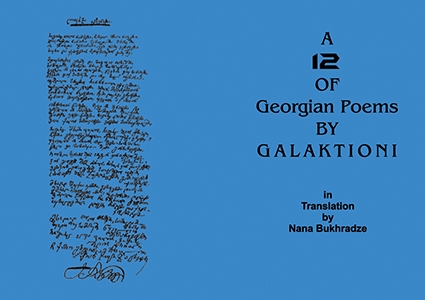Galaktion: 12 Poems Translated & Published
Georgia is a country in which poetry plays a vital role in the national consciousness, and Georgians hold the poems of Galaktion Tabidze in especial affection.
To this day his works are studied by every Georgian schoolchild, declaimed in countless toasts, and remain a great influence on modern Georgian poets and artists.
Although he spent almost his entire life in Georgia, surviving both the Revolution and Stalin’s purges, his work carries a variety of influences from the west, particularly from Baudelaire and the French Symbolists.
Beautifully translated by Nana Bukhradze, these poems weave complex themes of love, loneliness, memory and homeland with musical grace. Though this small collection represents only a fraction of Tabidze’s work, it contains some of his most popular and powerful poems; ‘Snow’ and ‘Blue Horses’ in particular are masterpieces of lyrical subtlety and invention.
I hope this edition will allow English-speaking readers to acquaint themselves with one of the greatest poets of the Georgian language.
Henry Roe,
London, January 2017
What Is the Time?
Poem by Galaktion Tabidze, Translated by Nana Bukhradze
The hour, no doubt has grown late,
This night’s long grief is my heart’s constant servant.
This stinging remorse gives me no peace
What is the time? What is the time?
Through the window the night won’t wane an inch,
All of Autumn’s miseries deluge me.
It might only be three!
What is the time? What is the time?
It must be a quarter past three, surely?
But the night is still as dark as pitch.
The station bell screams thirteen –
What is the time? What is the time?
Ah, strains the gloom-shrouded corridor
This night coachman to accommodate fi tly.
Again the telephone – ringing nervously:
What is the time? What is the time?
God, this vengeful early morning rain
Pours incessantly like a jet of pitch!
Won’t it end, this spiteful night?
What time is it? What time is it?
‘Time for drunkenness,
Bitter and precious
Wine’s hour has struck!’
So answered Charles Baudelaire,
When the question was asked –
What is the time?
1914











